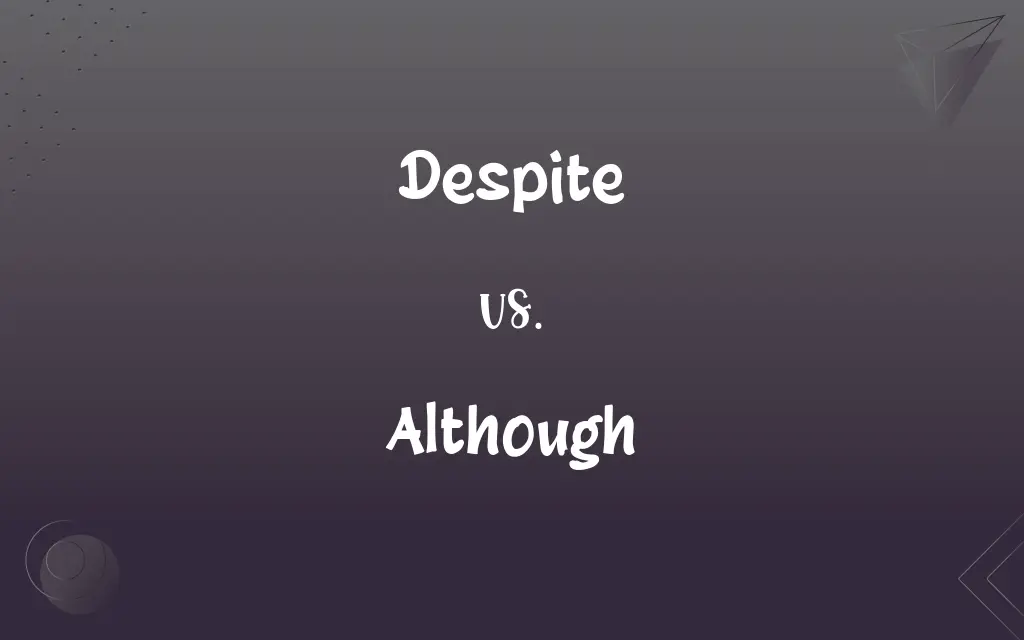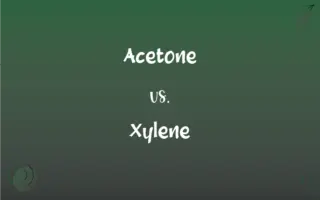Despite vs. Although: What's the Difference?
Edited by Aimie Carlson || By Harlon Moss || Updated on November 15, 2023
"Despite" is a preposition meaning "in spite of," while "although" is a conjunction indicating contrast or exception.

Key Differences
"Despite" and "although" are two terms in English that introduce contrast. The word "despite" serves as a preposition, and it's often followed by a noun or a gerund, indicating something that is true or occurs even if something else might have prevented it.
In comparison, "although" is a conjunction. It is typically used to introduce a dependent clause, suggesting contrast or exception. The word "although" allows for the combination of two statements, showing that one statement doesn't negate the truth or validity of the other.
For instance, one might use "despite" to express a scenario like: "Despite the rain, we went to the park." Here, the action of going to the park happens even if rain might have been a deterrent. The emphasis here is on the occurrence of an event in the face of potential obstacles.
In contrast, using "although" would look like this: "Although it rained, we went to the park." This usage implies a juxtaposition between the two events, showing that while one event occurred, the other did too, and neither negates the other.
Comparison Chart
Part of Speech
Preposition
Conjunction
ADVERTISEMENT
Followed by
Noun or Gerund
Dependent Clause
Usage
Introduces a contrasting event
Combines two contrasting statements
Example
Despite the cold, she wore a dress.
Although it was cold, she wore a dress.
Grammatical Structure
"Despite + [noun/gerund]"
"Although + [subject + verb]"
Despite and Although Definitions
Despite
In spite of; without being affected by.
Despite challenges, he succeeded.
ADVERTISEMENT
Although
Indicating contrast or exception.
He's friendly, although a bit shy.
Despite
Even with the existence or occurrence of.
She laughed despite feeling sad.
Although
While on the contrary.
He's organized, although his brother isn't.
Despite
Contrary to what one might expect or predict.
Despite his age, he's quite agile.
Although
Even though; despite the fact that.
Although tired, she finished the race.
Despite
Regardless of; not prevented by.
We traveled despite the warnings.
Although
Used to introduce a concession.
Although small, the room is cozy.
Despite
Showing defiance or resistance against.
Despite all odds, they prevailed.
Although
Yet; but.
She's diligent, although sometimes too meticulous.
Despite
In spite of; notwithstanding
Won the game despite overwhelming odds.
Although
Regardless of the fact that; even though
Although the room is big, it won't hold all that furniture.
Despite
Contemptuous defiance or disregard.
Although
But; however
He says he has a dog, although I've never seen it.
FAQs
Can "despite" begin a sentence?
Yes, e.g., "Despite his efforts, he lost."
Does "although" always indicate contrast?
Yes, it introduces a contrasting clause.
Can "despite" introduce a reason?
No, it introduces a contrasting event or fact.
Can "although" start a sentence?
Yes, e.g., "Although he tried, he failed."
Does "although" always need a contrasting conjunction like "but"?
No. The contrast is often implied with "although" alone.
How is "although" different from "since"?
"Although" shows contrast; "since" can show time or cause.
Can you replace "although" with "but"?
Not directly. Their structures and placements differ.
Which is more formal: "although" or "though"?
"Although" is slightly more formal.
Can "despite" end a sentence?
Rarely. It's typically used before a contrasting statement.
Is "although" followed by a comma?
Often, especially when starting a sentence, e.g., "Although it rained, we played."
What can follow "despite"?
A noun or gerund, e.g., "Despite the rain..."
Can "although" be replaced with "though"?
Often, yes. "Though" is a more informal variant.
Does "despite" have synonyms?
Yes, "in spite of" is a common synonym.
Are "despite" and "in spite of" always interchangeable?
Often, yes, but the sentence structure may need slight adjustment.
What's a common mistake with "despite"?
Using "despite of" instead of "despite" or "in spite of."
Can "although" express a positive contrast?
Yes, e.g., "Although it's cheap, it's of high quality."
Is "despite" used more in writing or speech?
Both, but it might be more common in formal writing.
Is "although" followed by a complete sentence?
Typically, it's followed by a dependent clause.
Can "despite" and "although" be used interchangeably?
Not always. Their grammatical structures differ.
Can you use "despite of" in a sentence?
No, it's incorrect. Use "despite" or "in spite of."
About Author
Written by
Harlon MossHarlon is a seasoned quality moderator and accomplished content writer for Difference Wiki. An alumnus of the prestigious University of California, he earned his degree in Computer Science. Leveraging his academic background, Harlon brings a meticulous and informed perspective to his work, ensuring content accuracy and excellence.
Edited by
Aimie CarlsonAimie Carlson, holding a master's degree in English literature, is a fervent English language enthusiast. She lends her writing talents to Difference Wiki, a prominent website that specializes in comparisons, offering readers insightful analyses that both captivate and inform.






































































